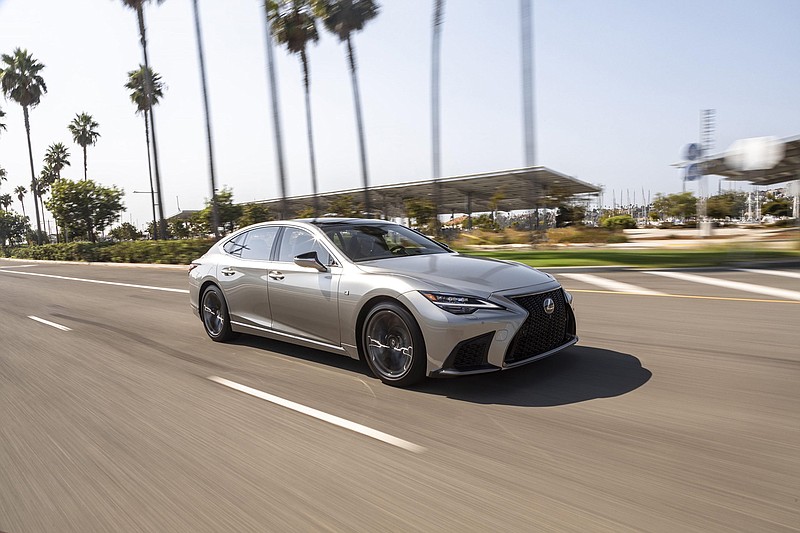Driving a Lexus LS 500h is still a tremendous pleasure - one is swaddled in comfort and exhilarated by the performance - but, realistically, this is no longer one of the best luxury cars on the planet.
Starting at $76,000 and soaring to nearly $120,000 like our hybrid version tester that checked just about every option box there is, the LS 500 family no longer is the value leader in the super-luxury large sedan class. The Genesis G90, starting at $73,975, is the most car for the money, while the BMW 7-series, Mercedes S-Class, and Audi A8 are more athletic and seem to have a better handle on technology.
For 2021, Lexus - finally - went with a 12.3-inch touchscreen, giving drivers some relief from its glitchy and annoying touchpad interface. Simple tasks like turning on the heat seater and steering wheel heater can now be controlled with buttons on the center console.
That's much better but, still, this car has amazingly complex technology and new owners must traverse a learning curve before using all of it becomes easy. Still, it's a Lexus, after all, and is probably one of the most reliable cars you can buy. If you do get one, get everything the way you want it before you leave the driveway.
How good? Who knows?
As an aside, let me say that I say the Lexus LS is probably reliable because, truth be told, automotive journalists don't know. Manufacturers know, but internal data about repairs is strictly confidential. Writers are left to rummage through a variety of sources, like delving mean from shadows on a cave wall, to try to identify trends.
One of my favorites, reliabilityindex.com, is based in England, where warranty data is public. Sometimes, vehicles are marketed under different names in Europe, so there is some sorting to do. Another is repairpal.com, which aggregates data from reporting mechanics. This data is from older, out-of-warranty vehicles. Consumer Reports uses inherently unreliable self-reporting surveys tempered with input from staffers, many with technological degrees, so the final product is pretty good.
Back to the subject at hand, those three all rate the Lexus LS series, introduced in 1989, as above average but with a tendency to develop electrical and suspension issues over time. Driveline, steering, cooling, and braking systems are bulletproof.
The latest version of the LS hit the streets in 2018 and, according to Consumer Reports, had a boatload of problems, including a recall for faulty fuel pumps. There is not enough public information to determine whether these issues were resolved with subsequent model years.
Caveat emptor.
Unrelenting luxury
All LS 500 models are assembled with splendid materials, flawless craftsmanship, and Omotenashi, anticipatory hospitality that caters to a guest's needs before they need them.
More than once, Blonde Bride and I ended a trip by just sitting in the driveway, relishing deep massages from heated seats and grooving to concert-hall music from the 24-speaker, 2,480-watt, Mark Levinson Quantum Logic sound system.
Never had I heard so clearly the Eagles' seven-part harmony. It felt like each guy was standing in a circle around us. OMG!
I cannot begin to recall all the ways this car pleases. The hand-stitched leather, arm handles that seemed to float with ambient lighting, every touchpoint speaks of quality. With the executive package, the right rear seat reclined and had heated massages. power sunshades on the side and rear raised and lowered themselves with the touch of a button.
The list of safety gear could fill a book. The car easily kept itself in its lane and a safe distance from the vehicle ahead. It watched for pedestrians and side traffic. It kept an eye on blind spots. It read road signs and put them in a head-up display. It managed the high beams.
Still, the car has its low points: 20-inch wheels and tires look terrific but transmit much more road imperfections into the cabin than earlier models. For 2021, Lexus tweaked the suspension to overcome this a bit, but one would expect a detail such as that to have been addressed from the beginning.
Handling, as one would expect in a 4,900-pound luxury sedan, is a bit soft. Still, the car feels well planted at speed.
Instead of a traditional 8-cylinder, Lexus engineers went with a 3.5-L, twin-turbo V-6 that puts out 416 hp and 442 pound-feet of torque. It has just a skoosh of turbo lag, but 0-60 comes in just 4.6 seconds. Our hybrid tester came with a detuned 3.5-L V-6 and front and rear electric motors. It hit 60 mph in 5.1 seconds. Top speed is limited to 146 mph, according to the factory.
Both systems result in a car that gets decent fuel economy - 23 mpg for gas only, 28 hybrid - while offering a buttery and powerful response at all speeds.
Bottom line
The latest Lexus LS is very good, but some of the competitors are better.



